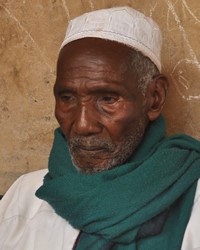The ground is level at the foot of the cross, meaning that all are welcomed and received equally when they come to God through faith in Jesus Christ. Jesus made a full and final atonement for the sins of Adam and all his descendants. Not only does God desire that all would arrive at the cross (1 Timothy 2:4), He commands it (Acts 17:30). The ground is indeed level at the foot of the cross, but the road leading there is not. For some there are seemingly insurmountable obstacles along the way.
To the place I heard the Gospel for the first time, I drove one mile on a paved road. I passed no checkpoints, and no armed guards asked where I was going. I walked into the building in broad daylight. It was not an underground church service. I feared no retaliation from a religious system. No family member opposed my going or persecuted me afterward. I heard the message in my language without it going through an interpreter. If I did not know better, I might think God loves me more than most people in the world. For me, the road to the cross was smooth and easy. I wish it were for everyone.
Most in the world know nothing about the cross or that there is even a road to it. No one gets to the cross without the message of the Gospel, and it simply has not been declared where they live. Contrary to God’s will, these poor souls live and die without the Gospel.
Another huge obstacle is social control, commonly called peer pressure. A society keeps its people in line with the threat of punishments. Punishment might be mild like gossip or ostracism or as serious as death. We have heard of a father killing his child that converted to Christianity. It is much easier to get to the cross from North Carolina than from North Korea! The fear of exile from a family or group is terrifying. A Muslim in Indonesia told a BBTI graduate, “I am an Indonesian, a Sunda Muslim. If I trust Christ, I am no longer a Sunda. If I am not a Sunda, I am nothing. I have no home, no family, no house, no relationship. I know I am a sinner, and I do not want to be punished for my sins. I know Jesus Christ is the Savior of the world, but I would rather risk suffering eternally in the lake of fire than to lose my social identity in this life.” (Missionaries in these difficult places are not going to see quick results; we need to be patient with them.)
To illustrate this difficult struggle against social control, consider the following from BBTI graduate Emanuel, who along with his wife, Courtney, works with Afghan refugees in Greece:
“Iman is not like the normal Hazara Afghans that are the majority here. In fact, there is a lot of fighting between Iman’s Panjshir group and them. Iman says they all convert easily because they don’t take their religion seriously. They will change again later from Jesus to something else when the situation affords. Iman on the other hand owns his faith. He has a very strong national pride that relates to his religion…But then here comes the dichotomy. For all this die-hard insistence, in the same conversation he will confess that he is tired of religion and wishes there were a way to connect with God directly without going through books, prophets, and go-betweens.
Over the weeks, we have had many conversations about the identity of Jesus. We showed him many scriptures, each of them shedding more light, but still, he would insist that he cannot accept that Jesus is God. We learned not to press the point. Instead, we befriended him, along with many others. We built trust, and he started coming and reading the Bible. When his younger brother was missing for days, we prayed with him. We let him talk about his life, his brothers who are fighting the Taliban, his mother whom he loves more than any other person, the three cows they have, the customs and values they live by, the climate of his mountain home, why he left it, the challenges along the way, and how he misses his family. For every hour we have spent teaching, we have spent as much listening. Slowly he was drawn in.
Now, he enjoys the Bible more and interacts with it better than most Christians I know. I can give him a passage, and he will read it and then preach it to me. He would make a great preacher. He loves Jesus… Still, he could not accept Christ’s identity. Until recently that is.
The other day we had a God-ordained hour with him, showing repeatedly that Jesus was in fact worshipped by men and angels, that he not only permitted it, but God commanded it, and that one day every tongue, including Iman’s, will confess that Jesus is Lord. At the end, he confessed that he believes it is true, but he has a family, which I suspicioned, for all his claims of independence, was the real reason he could not accept Jesus as the Son of God. If Jesus is right, his family, his nation, his heritage, has been mistaken for hundreds of years. That is an incredibly hard pill to swallow for one who is not bitter and hurt by his native culture, but proud of it…For such a person to become a follower of Jesus, what must he lose? Father, mother, brother, and sister, yes, Islam. He must find a new reference point, with new values, new beliefs, a new community, a new Lord and Master, a new Book, a new road, a new everything. Nothing old can stay the same. All that is dear to him must be eclipsed by One who beckons to him with nail scars in his hands and feet.”
It was easy for me to accept Jesus. I did not lose my family, my job, or my country. Not so for many. What will it take to get people like the Sunda Muslim or Iman down the road to the cross? Someone must obtain specialized training for the task. He must give up all he knows and loves and go to where they live, he must patiently learn new tongues and cultures, and he must not look for shortcuts or quick results. He must be willing to walk a difficult, dangerous road with the seeking sinner until they reach the level ground at the foot of the cross.
Spring 2022
 Brother Johnny Leslie, missionary to Croatia, was preaching about John the Baptist having his head cut off. He should have said odrezati but instead said narezati. Both words mean “cut,” but the congregation roared with laughter because narezati is only used when talking about slicing something like salami!
Brother Johnny Leslie, missionary to Croatia, was preaching about John the Baptist having his head cut off. He should have said odrezati but instead said narezati. Both words mean “cut,” but the congregation roared with laughter because narezati is only used when talking about slicing something like salami!




 There was no headstone for Charlotte Rowe until her name was uncovered among the missionaries appointed by American Baptist International Ministries during research as it prepared for its 200th anniversary.
There was no headstone for Charlotte Rowe until her name was uncovered among the missionaries appointed by American Baptist International Ministries during research as it prepared for its 200th anniversary.









